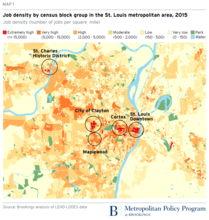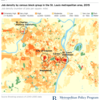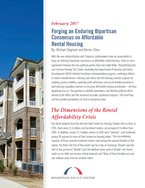0
Publication
Community:
Mar 1, 2023
Research suggests that two-generation (2Gen) approaches can help interrupt the economic and social barriers to many families’ economic mobility and increased well-being and carry long-term benefits. Child Trends – in partnership with Ascend at the Aspen Institute – conducted new analyses for this report, which provides a current data snapshot of some of the families in the United States who may be eligible for and benefit from 2Gen supports and services. Policymakers, researchers, and program evaluators should pay attention to these same data points in efforts to assess families’ needs and identify supports to help them thrive.
Authored by:
Topics: Advocacy, Dual-generation, dual-generation initiative, Low-income, Mobility
 Shared by Molli Caite Hughes
Shared by Molli Caite Hughes
Molli Caite Hughes posted a
on Jan 18, 2024
Research suggests that two-generation (2Gen) approaches can help interrupt the economic and social barriers to many families’ economic mobility and increased well-being and carry long-term benefits.
0
Publication
Community:
Sep 23, 2022
The Effects of ‘Food Deserts’ on Public Housing Residents Living with Diabetes
Authored by: National Center for Health in Public Housing
Topics: Energy, Exercise, Health, Healthy homes, Mobility, Nutrition
 Shared by Gabe Castro
Shared by Gabe Castro
Gabe Castro posted a
on Sep 23, 2022
National Center for Health in Public Housing
The Effects of ‘Food Deserts’ on Public Housing Residents Living with Diabetes
0
Publication
Community:
Mar 27, 2019
Housing is at the epicenter of all opportunities and outcomes. It is the first rung on the ladder to economic opportunity, and a person’s access to opportunity is linked with that of their community. From health, to economic mobility, to educational opportunity, to racial equity, and beyond, housing shapes families and communities.
Authored by: Maya Brennan and Veronica Gaitan for How Housing Matters, The Urban Institute
Topics: Asset building, Education, Health, Homelessness, Housing, Low-income, Mobility, Racial inequalities
 Shared by Housing Is
Shared by Housing Is
Housing Is posted a
on Mar 28, 2019
Maya Brennan and Veronica Gaitan for How Housing Matters, The Urban Institute
Housing is at the epicenter of all opportunities and outcomes. It is the first rung on the ladder to economic opportunity, and a person’s access to opportunity is linked with that of their community.
0
Publication
Community:
We can imagine a future where everyone can find and afford a quality home. Where every neighborhood offers a diversity of housing options. And where people up and down the income ladder can enjoy housing security and build wealth through ownership. Achieving this vision requires more than incremental tinkering with today’s market institutions and public policies. It requires bold innovation by changemakers at all levels of government and in the private and nonprofit sectors.
Authored by: Urban Institute
Topics: Housing, Legislation & Policy, Mobility, Racial inequalities, Research
 Shared by Housing Is
Shared by Housing Is
Housing Is posted a
on Feb 21, 2019
We can imagine a future where everyone can find and afford a quality home. Where every neighborhood offers a diversity of housing options. And where people up and down the income ladder can enjoy housing security and build wealth through ownership.
0
Publication
Community:
Jan 24, 2019
Affordable housing campaigns are not new, of course, but what is unprecedented and transformative about Opportunity Starts at Home is the scope and diversity of the partners that are joining forces to advocate for more robust and equitable federal housing policies. The campaign is advised by a Steering Committee including leading national organizations representing a wide range of interests that are working shoulder-to-shoulder to solve the affordable housing crisis.
Authored by: Opportunity Starts at Home
Topics: Asset building, Child welfare, CLPHA, Community development, Early childhood, Education, Food insecurity, Funding, Health, Homelessness, Housing, Immigrants, Legislation & Policy, Low-income, Mobility, Out-of-school time, Partnerships, Racial inequalities, Safety, Seniors, Stability, Substance abuse, Youth
 Shared by Mica O'Brien
Shared by Mica O'Brien
Mica O'Brien posted a
on Jan 24, 2019
Opportunity Starts at Home
Affordable housing campaigns are not new, of course, but what is unprecedented and transformative about Opportunity Starts at Home is the scope and diversity of the partners that are joining forces to advocate for more robust and equitable federal housing policies.
0
Publication
Community:
Safe, affordable housing enables low-income people to climb up the income ladder and achieve the American Dream.
Authored by: Opportunity Starts at Home
Topics: Asset building, Housing, Mobility, Partnerships, Research
 Shared by Mica O'Brien
Shared by Mica O'Brien
Mica O'Brien posted a
on Jan 18, 2019
Opportunity Starts at Home
Safe, affordable housing enables low-income people to climb up the income ladder and achieve the American Dream.
0
Publication
Community:
Nov 14, 2018
In collaboration with Project for Public Spaces (PPS), the National Main Street Center (NMSC), and others, the Bass Center will examine the place needs of people and businesses and use that knowledge to help public, private, and civic sectors leaders develop new approaches to creating and supporting concentrations of economic activity that drive inclusive economic growth. The Center is premised on the idea that these “economic districts” represent the geographies in which leaders can have the most transformative impact—where they can build local trust and understanding, experiment safely, show results early and often, and measure impact against a place-centered vision and goals.
Authored by: Jennifer S. Vey for The Brookings Institution
Topics: Community development, Low-income, Mobility, Partnerships, Place-based
 Shared by Mica O'Brien
Shared by Mica O'Brien
Mica O'Brien posted a
on Dec 5, 2018
Jennifer S. Vey for The Brookings Institution
In collaboration with Project for Public Spaces (PPS), the National Main Street Center (NMSC), and others, the Bass Center will examine the place needs of people and businesses and use that knowledge to help public, private, and civic sectors leaders develop new approaches to creating and supporting
0
Publication
Community:
Dec 5, 2018
The Tax Cuts and Jobs Act of 2017 provides a new incentive—centered around the deferral, reduction, and elimination of capital gains taxes—to spur private investments in low-income areas designated by states as Opportunity Zones. This provision is based heavily on the Investing in Opportunity Act (S. 1639) introduced by Senator Cory Booker (D-NJ) and Senator Tim Scott (R-SC). Given the significant interest among investors, it is possible that this new tax incentive could attract hundreds of billions of dollars in private capital, making this one of the largest economic development initiatives in U.S. history.
Authored by: Bruce Katz and Ken Gross
Topics: Community development, Funding, Legislation & Policy, Mobility, Place-based
 Shared by Mica O'Brien
Shared by Mica O'Brien
Mica O'Brien posted a
on Dec 5, 2018
The Tax Cuts and Jobs Act of 2017 provides a new incentive—centered around the deferral, reduction, and elimination of capital gains taxes—to spur private investments in low-income areas designated by states as Opportunity Zones.
0
Publication
Community:
Jan 1, 2018
More than 50 years after the passage of the Fair Housing Act, what would it take to meaningfully reduce residential segregation and/or to mitigate its negative consequences in the United States? In this volume, leading academics, practitioners, and policymakers grapple with this question, examining different aspects of the complex and deeply rooted problem of residential segregation and proposing concrete steps that could achieve meaningful change withing the next ten to fifteen years.
Authored by: Joint Center for Housing Studies of Harvard University
Topics: Community development, Legislation & Policy, Mobility, Place-based, Racial inequalities, Research
 Shared by Mica O'Brien
Shared by Mica O'Brien
Mica O'Brien posted a
on Oct 25, 2018
Joint Center for Housing Studies of Harvard University
More than 50 years after the passage of the Fair Housing Act, what would it take to meaningfully reduce residential segregation and/or to mitigate its negative consequences in the United States?
0
Publication
Community:
On September 20, 2018, a panel of researchers and practitioners discussed new research and ongoing challenges associated with the HCV program at HUD’s Quarterly Update from the Office of Policy Development and Research.
Authored by: PD&R Edge Online Magazine
Topics: Housing, Legislation & Policy, Low-income, Mobility, Racial inequalities, Research
 Shared by Mica O'Brien
Shared by Mica O'Brien
Mica O'Brien posted a
on Oct 10, 2018
PD&R Edge Online Magazine
On September 20, 2018, a panel of researchers and practitioners discussed new research and ongoing challenges associated with the HCV program at HUD’s Quarterly Update from the Office of Policy Development and Research.
1
Publication
Community:
May 25, 2017
Neighborhoods are constantly changing as residents come and go, businesses open and close, and properties go up or come down. No place is the same for long. When community changes are widespread or stark, the conversation shifts from change to “gentrification,” the definition of which is often subject to debate. At its heart, gentrification happens when a low-income area that has experienced disinvestment attracts new economic investments and higher-income residents. But the benefits of these changes can be overshadowed by the perpetuation of disadvantage.
Authored by: How Housing Matters for The Urban Institute
Topics: Community development, Housing, Low-income, Mobility, Racial inequalities
 Shared by Mica O'Brien
Shared by Mica O'Brien
Mica O'Brien posted a
on Sep 27, 2018
How Housing Matters for The Urban Institute
Neighborhoods are constantly changing as residents come and go, businesses open and close, and properties go up or come down. No place is the same for long.
0
Publication
Community:
Jul 12, 2018
With the new administration and Congress, policymakers have an opportunity to forge an enduring bipartisan consensus on affordable rental housing. There is more agreement between the two political parties than one might think: Strengthening the Low-Income Housing Tax Credit, expanding the Department of Housing and Urban Development (HUD)’s Rental Assistance Demonstration program, continuing efforts to reduce homelessness, infusing real choice into the housing voucher program by enabling greater mobility, expanding self-sufficiency and asset-building incentives, and reducing regulatory barriers to increase affordable housing production—all have bipartisan buy-in. The question is whether lawmakers can find the political will to devote to the effort and the resources to make significant progress. This brief lays out the possible parameters of such a consensus plan.
Authored by:
Topics: Dual-generation, Funding, Homelessness, Housing, Legislation & Policy, Low-income, Mobility, RAD, Research
 Shared by Housing Is
Shared by Housing Is
Housing Is posted a
on Jul 12, 2018
With the new administration and Congress, policymakers have an opportunity to forge an enduring bipartisan consensus on affordable rental housing.
 Shared by Molli Caite Hughes
on Jan 18, 2024
Shared by Molli Caite Hughes
on Jan 18, 2024
 Shared by Gabe Castro
on Sep 23, 2022
Shared by Gabe Castro
on Sep 23, 2022
 Shared by Housing Is
on Mar 28, 2019
Shared by Housing Is
on Mar 28, 2019
 Shared by Housing Is
on Feb 21, 2019
Shared by Housing Is
on Feb 21, 2019




 Shared by Housing Is
on Jul 12, 2018
Shared by Housing Is
on Jul 12, 2018




